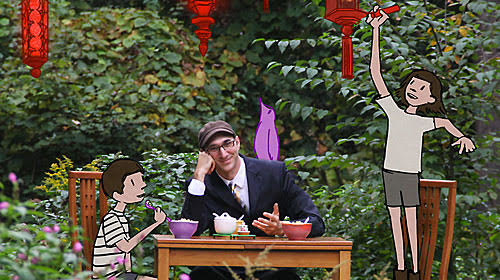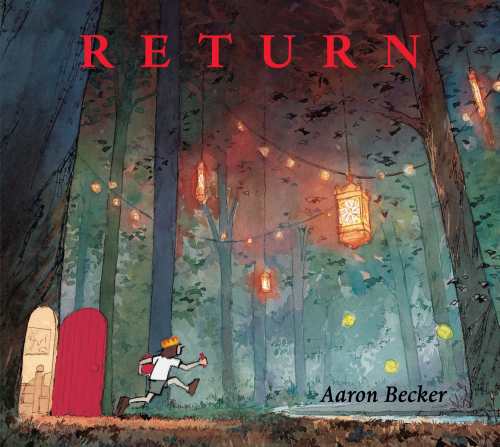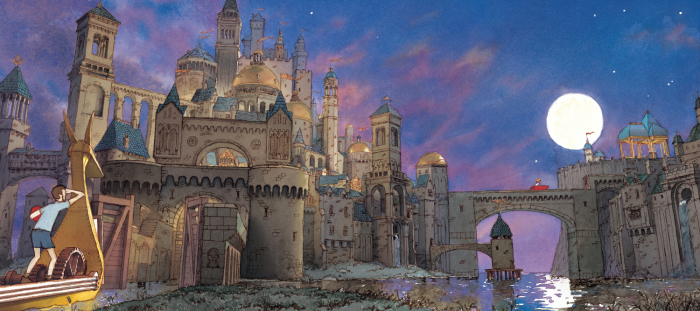Wordless Books Uncage the Imagination

Cracking the cover of Aaron Becker’s Journey trilogy, from Candlewick Press, initiates a plunge into a gorgeous, expansive, and dreamlike world—a world so vivid that words become unnecessary before the grandeur of what’s offered. With his award-winning series, Becker took wordless picture books to new levels, and the wide-ranging responses of the children who journey with his lead are only proof of the series’ central theme: that the imagination is a powerful and transformative tool.
We were drawn into the magic of these books, too—and were impressed by Becker’s encouraging ways of introducing the series to readers. Even when responding to critics, he champions the notion that the directions that his stories take are up to readers, too; that is the power of a great illustrated story, that directs the eye not only outward, but inward as well.
What moved you to pen the Journey trilogy, and what do you hope children take away from it?


Aaron Becker, Candlewick Press. 'It's a story about the power--and limits--of the imagination.'
Journey began as an exploration of space, specifically the space of the imagination and wonder. I drew this giant picture of a castle and for some reason placed a child in a boat heading towards its buttressed canals. The rest of the book emerged organically from that first drawing. When I was a kid, making images was a way of controlling my experience of the world - after all, on a piece of paper I could make all of the rules. I hope kids have that sort of experience as they fill in the story in this wordless adventure.
Your illustrations are lush, imaginative, and cinematic. Do you currently have any plans to take these books to the silver screen?
I’ve always been a big fan of the power of cinema. I used to work as a concept illustrator for animation companies before getting into children’s books. So thinking of Journey as a film makes perfect sense to me. We’re working with some producers at the moment to see if this might come to fruition. I like the idea of something new growing out of these books, whether it be a film or some other form of storytelling or artistic expression. That said, the books will remain their own experience. I don’t think a film can change that.

RETURN. Copyright 2016 by Aaron Becker. Reproduced by permission of the publisher, Candlewick Press, Somerville, MA.
You gave a great and thoughtful response to an Amazon reviewer who claimed that your series wasn’t feminist enough. What prompted you to respond to that feedback?
The thing about a wordless book is that the interpretation of the story is totally up to the reader. People put their own life experiences and feelings into the images, and this particular reviewer saw something in the book that went so far against my intentions that I felt the need to reply. The thing about any review, good or bad, is that you, as an author, have to realize that the book you’ve written is no longer yours the second it hits the shelves. This is especially true for a wordless picture book where the story only exists BECAUSE of the reader’s efforts. To me, Journey isn’t feminist or antifeminist. It’s a story about the power (and limits) of the imagination. It’s a universal theme that seems to hit home for both boys and girls; children and adults. But you can’t please everybody and that’s okay.
You’ve just come off of a book tour for Return. Would you care to share any favorite moments from this tour (or tours previous)?
I had one experience that clearly stands out. A young girl asked me why the emperor in the story wants to imprison the purple bird. When I’m reading to an audience, I never give a direct answer but instead turn the question back around to find out what the child (or adult) might be thinking. So I asked her “Why do you think he wanted to put the bird in a cage?” And without missing a beat, she answered “Maybe he was afraid of it.” That just blew me away. She was probably four or five years old and there she was extrapolating something from the story that I’m not even sure most adults understand. We cage what we fear.
Can you tell us about the experience of working with Candlewick to bring your series to press?
From the get go, Candlewick understood what this story was about. Interestingly, I had met my editor twenty years before the book’s publication at an SCBWI event out in California. So when I got an offer letter with her name on it, I knew it was meant to be. Candlewick is one of the only independent publishers devoted strictly to children’s books left in the United States and, because of this, they have freedom to take risks on books like Journey that otherwise might not get made. I feel truly blessed to have landed with them as my publisher.
What projects do you have coming next?
I have a few books in the works. One is a toddler book (!) and the other is a wordless picture book that looks nothing like the watercolors from the Journey trilogy. I’m so excited about these new stories and can’t wait to share them with the world!
Your books are wordless, and so your heroine goes unnamed. Does she have a name to you, or is it important that she stay a kind of everychild for young readers?
When I get the question at readings as to the girl’s name, I always ask the audience to close their eyes and imagine the name they’d like for her. When they open their eyes, I tell them that I’m about to tell them the real name - the one that I had in mind since I started the first book. So I tell them to look inside their head once again. The girl’s name, it turns out, is the one they’ve imagined. It was there all along.

Michelle Anne Schingler is the managing editor at Foreword Reviews. You can follow her on Twitter @mschingler or e-mail her at mschingler@forewordreviews.com.
Michelle Anne Schingler
